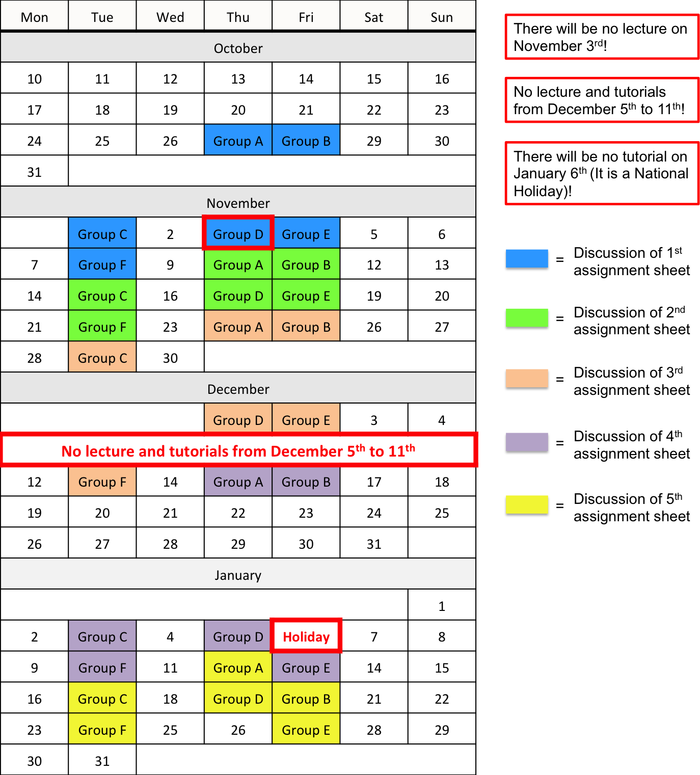Course Organic Computing
In order to answer your questions during the preparation for the exam, we have prepared a Google Doc File as a forum:
- Please write your new question by indicating it with "Q:"
- You can answer the questions on the forum or add comments to them.
- We try to answer the questions as soon as we can.
Description
Organic Computing addresses design and particularly control of distributed technical systems which are meant to be self-organized. Imagine we have a group of cleaning robots and want to use them to clean an unknown environment. How can we program them to work together and coordinate themselves in a self-organized way? How can we increase the efficiency of the system? How can we avoid overlaps between the areas to be cleaned? How can we control them? In this course, you will learn the basics in designing self-organized systems and learn different architectures to control self-organized systems. We will talk about adaptive systems and degrees of self-organization with the major focus on distributed technical systems. The following topics will be covered:
- Introduction to Organic Computing (OC)
- Agents and Multi-agent Systems
- Emergent Behavior
- OC-Architectures
- Machine Learning
- Learning Classifier Systems (LCS)
- Evolutionary Algorithms
- On-line and Off-line learning
- Robustness and Reliability of OC Systems
- Prediction in OC Systems
Lecturers
- Sanaz Mostaghim (Lectures)
- Heiner Zille (Tutorials)
- Dominik Weikert (Tutorials)
Lectures
The lectures take place: Thursdays 11:00 - 12:30 in G29 – 307
Slides:
- Chapter 0: Organization and Introduction
- Chapter 1: Multi-Agent Systems
- Chapter 2: Architectures of OC Systems
- Chapter 3: Learning Systems
- Chapter 4: Robustness
- Chapter 5: Estimation Methods
Recorded lectures
- Thursday 20.10.2016 -> sorry it didn't work
- Thusrday 27.10.2016: Chapter 1
- Thursday 10.11.2016: Chapter 2
- Thursday 17.11.2016: Chapter 3 -> Didn't work
- Thursday 24.11.2016: Chapter 3
- Thursday 01.12.2016: Chapter 3
- Thursday 15.12.2016: Chapter 4
- Thursday 05.01.2017: Chapter 4
- Thursday 12.01.2017: Chapter 4
- Thursday 19.01.2017: Chapter 5
Tutorials
Assignments:
- Assignments 1 (to be discussed in tutorials from 27.10. - 08.11.)
- Slides 1 (from 27.10. - 08.11.)
- Assignments 2 (to be discussed in tutorials from 10.11. - 22.11.)
- Assignments 3 (to be discussed in tutorials from 24.11. - 13.12.)
- Assignments 4 (to be discussed in tutorials from 15.12. - 13.01. Please refer to the schedule below.)
- Assignments 5 (to be discussed in tutorials from 12.01. - 27.01.)
Old Exams:
These old exams are for practice. Not all contents of these exams are included in this years lecture, and some new contents from this year do not occur in the old exams. However, you can use them to get a feeling for the type of assignments and the time needed to solve them.
- Exam SS 2013 (Duration of exam was 60 minutes)
- Exam WS 2015/16 (Duration of exam was 120 minutes)
As a requirement for the exam, you need to participate in a tutorial of the course! You need to register for a tutorial group and then visit the group you registered for.
Participation in the tutorials consists of preparing answers to the written assignments at home as well as coming to the tutorials and presenting your solutions to your fellow students. At the beginning of each tutorial, we will ask you to volunteer for those assignments that you prepared. You pass the tutorial (and are allowed to write the exam) only if you volunteer for at least 2/3 of all assignments and presented a solution at least two times. (Update: you only need to present a solution 1 time instead of 2.)
There are six groups, but the tutorials are every second week only. This means the six groups are distributed to three time slots:
- Groups A and D: Thursdays, 15:15 – 16:45 (Bldg. 05 – Room 308)
- Groups B and E: Fridays, 11:15 – 12:45 (Bldg. 12 – Room 129)
- Groups C and F: Tuesdays 13:15 – 14:45 (Bldg. 22A – Room 210)
The registration is open from 13th Oct. 18:00 o’clock until 20th Oct. 18:00 o’clock.
The tutorials will start on Thursday, 27th October with Group A!
The currently planned schedule for the assignments looks as follows: (Changes might be made, please check regularly).

Tutorial language is English.
Literature
- Christian Müller-Schloer, Hartmut Schmeck and Theo Ungerer, Organic Computing — A Paradigm Shift for Complex Systems, Springer, 2011
- Gerhard Weiss, Multiagent Systems: A modern approach to distributed artificial systems, The MIT Press, 2000
- Jaime G. Carbonell, Engineering Environment-Mediated Multi-Agent Systems, Springer Verlag, 2008 Falko Dressler, Self-Organization in Sensor and Actor networks, John Wiley, 2007
- M. Parashar and S. Hariri (Ed.), Autonomic Computing: Concepts, Infrastructure and Applications, CRC, 2007
- S. Camazine, J. Deneubourg, N. R. Franks, J. Sneyd, G. Theraulaz and E. Bonabeau, Self-Organization in Biological Systems, Princeton University Press, 2003
- H. G. Schuster, Complex Adaptive Systems: An Introduction, Scator Verlag, 2001
- Eric Bonabeau, Marco Dorigo and Guy Theraulaz, Swarm Intelligence: From Natural to Artificial Systems, Oxford University Press, 1999
- R. S. Sutton, A. G. Barto, Reinforcement Learning - An Introduction, MIT Press, 2004
- K. Astrom, P. Albertos, M. Blanke, A. Isidori and W. Schaufelberger, Control of Complex Systems, Springer Verlag, 2001
- O. Babaoglu, M. Jelasity, A. Montresor, C. Fetzer, S. Leonardi, A. van Moorsel and M. van Steen, Self-star Properties in Complex Information Systems: Conceptual and Practical Foundations, Springer Verlag, 2005
- H. Sunan, T. K. Kiong, and L.T. Heng, Applied Predictive Control, Springer Verlag, 2002
- A.E. Eiben and J.E. Smith, Introduction to Evolutionary Computing, Springer Verlag, 1999
- Würtz, Rolf P. (Ed.), Organic Computing, Springer Verlag, 2008
- Stephen I. Gallant, Neural Network Learning and Expert Systems, The MIT Press, 1993